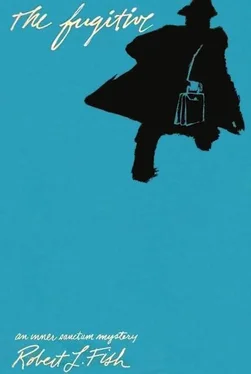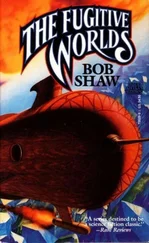“Fine. She is in Berlin, you know, visiting with Monica. You saw Monica’s last picture? No, I suppose not; not out here. But you knew that she had become an actress? Quite a good one, as a matter of fact, or at least so they say. She goes by another name, of course. Oh, things are going quite well, Uncle!”
“Are they?” The tone was querying, impersonal.
“Yes, they are.” Enough of this, von Roesler thought. “At home things are fine. How are they here?”
The old man thought before answering. They were high up on the serra by this time, and the scene below was one that he well remembered and had always loved. The island port of Santos hemmed in by rivers glistening in the sun, the lacelike beaches of São Vicente and Pria Grande to the right, the breakers visible as dancing white lines on deserted Guarujá to the left. Fifteen years in Brazil, and now what?
“What is going to happen, Erick?” The old man held his breath a moment, expelling it in his next question, as if it were forced from him. “Will there be a war?”
Erick shrugged. “You overestimate my place in the councils of the Reich, Uncle. But I should say, not necessarily. Only if it is forced upon us.” He looked over at his uncle. “Have you arranged the meeting?”
The old man shrank back into his corner, pulling the heavy coat about him. “At my chácara. Tomorrow.”
“Chácara?”
“My fazenda. The farm, Hartzlandia, you know. We should be there by evening.”
“By evening?” Almost instinctively, von Roesler glanced at his wrist watch. “My God! How far is it?”
The old man smiled. “Two hundred kilometers from here, and very close as they measure distances in Brazil. This is a big country, you know, Erick, and our roads aren’t the autobahns of Germany.”
Erick frowned. “Who will be at the meeting?”
“Everyone that I could think of. Or rather, that I could get. It was not easy, believe me,” the old man continued calmly. “There have been some bad frosts these past two weeks, and many of them did not want to leave their farms. But the majority finally agreed to come.”
“And they represent...?”
“The most influential of the German settlers here. You said not to bother with official representatives here...?” There was a question in his voice but the younger man disregarded it.
“Good.” They had passed the lip of the serra and the ocean was now hidden. The car had left the paved São Paulo highway and was following a winding dirt road; clouds of dust swirled behind them. There was a new sharpness in the air, and Erick rolled the window closed and leaned back. “Now exactly, who are they?”
The old man thought. “Well, first, there is Goetz. He comes from Blumenau. He makes wines; I came to Brazil with him fifteen years ago. And then there is Gunther, from Florianopolis. A schoolteacher, but quite influential. Head of the Turnverein, and the German club. Lange has a cattle ranch in Rio Grande do Sul, I don’t know how many head, but it’s a big one. Then there is Riepert from Paraná; he has a lumber business there, sawmill and cutting rights for large pine stands near his mill.” He ticked them off on his fingers. “Strauss comes from São Paulo, from the city, that is. He imports and exports, and is mixed up in local politics to some extent. And Gehrmann from the fazenda next to mine, also coffee. And a little sugar, but not much.” He paused, counting. “That’s the lot.”
“They are all rich?”
The old man smiled, “Rich? There are no rich men in Brazil today. You have to remember, we burned our coffee only three years ago. Land-rich, if you will; or better say land-poor.” He looked at the other sardonically. “Why? Did you come to ask them for contributions to the Winterhelf?”
The younger man disregarded this. “You told them the reason for the meeting?”
The old man shrugged. “How could I tell them what I don’t know? I simply wrote that you were coming on an official visit, and wanted to speak with them all together. I think they’ll come; I seldom ask favors.”
“Very good. Uncle Ernst.” Unconsciously the condescension had crept back into his voice. Erick leaned back, smiling at the older man, satisfied. “I think I’ll take a brief nap, if you don’t mind.”
He settled himself in one corner, closing his eyes. The old man sighed and stared broodingly out of the window. The scrubby bushes at the side of the road bowed beneath the heavy dust, shaking themselves slightly as the car swayed past. He pulled his overcoat tighter about him; even in the sun it seemed desperately cold.
Chácara Hartzlandia covered an area of twelve thousand hectares, spread along the Rio Taquary, and running almost to the little village of Itapeva. It was principally a coffee fazenda, although it also raised its own necessities in beans, rice, potatoes, and corn. The rolling hills were lined with the neat rows of bushy covas, rising and falling over the undulating land to disappear in the green distance. The drying sheds and the workers’ shacks were located in a sprawling banana grove at the side of the river, well out of sight of the big house; the stables and barns had their area further back in a thick stand of pine. The house stood alone on a hummock; below it the gardens ran in riotous color past a rough-stone-edged pool down to the river.
It was a great chalet, the gently sloping roof overhanging balconies that encircled the building at each floor, joined by wooden stairways. Huge hand-hewn beams of dark wood supported the stained plank walls; leaded glass windows studded the high walls and winked in the afternoon sun. It might have been transplanted intact from Württemberg, or Ostmark, Erick thought; it could have fronted the icy Bodensee, or stared down on Innsbruck from the challenging rocks above. His eyes unconsciously swept the horizon for snow-tipped mountains, and the growing sense of displacement that he had felt since leaving the boat slowly seeped away. “Beautiful,” he said sincerely. His uncle smiled slightly, but it was difficult to tell if the smile indicated sympathy or amusement.
They dined by flickering candlelight, although the farm boasted a modern generator, and afterwards in the huge living room listened to phonograph records before a crackling fire. The night had turned cold, and the fire was cheerful and welcome. They talked of family and the past; the subject of the meeting and the reason for Erick’s trip was avoided as if by mutual unspoken consent. His uncle was bending over the ancient phonograph, changing a record, and Erick was preparing to offer excuses for an early bedtime, when headlights swung into the driveway from the river road, and they could hear the labored clanking of an old car pulling up before the house. The motor coughed itself apologetically into silence, a car door slammed.
“Von Roesler!” a deep voice bayed. “Gott im Himmel! Why doesn’t the old man put a light on this verdammt driveway? Von Roesler, you old swine! A light!”
The old man rushed to swing back the door, and yellow light poured over the balcony, spilling down to the huge blond figure standing beside a battered Ford. “Goetz!” he cried in delight. “Come up! Come up! How did you ever make it in that wheelbarrow? From Blumenau, yet!”
“Wheelbarrow, eh?” said Goetz, clumping up the stairway. “This wheelbarrow will be running when both you and your fancy hearse have long gone to the graveyard!” He paused at the top of the steps, a wild-looking giant wearing a leather jacket over a turtle-neck sweater, his curly hair rumpled, eyeing the two men calmly. “So this is little Erick, eh? For whom we make long trips when we have a million things to do! Hello, little Erick! How is the Vaterland?” Erick felt his face reddening. The big man pushed past him almost brusquely, his handshake an obvious thing in passing, quick and almost insolent, going to warm himself at the fireplace. “Von Roesler! Even in the uncivilized south we at least have a little common hospitality! What do you have to drink?”
Читать дальше












